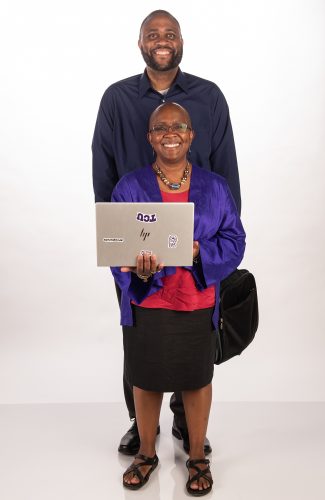Liberal arts majors looking toward their post-college careers have a campus class to help them consider their futures and the job market.
For several years, Claire Sanders and Terrence Hood have co-taught Make Your Major Work. Sanders is a senior instructor in history and co-director of the African American and Africana Studies minor. Hood, a former career consultant to AddRan College of Liberal Arts, is assistant director for alumni career services and student athletes in the BNSF Railway Career Center.
Here is what they cover in the class.
Your class is known as How to Get a Real Job With Your B.A. What do your students learn?
SANDERS: The course, which is a full decade old and runs for only eight weeks, is designed to put a floor under liberal arts majors. It gives them the tools they need to move forward in their job search and career path.

Claire Sanders is a senior instructor in history and co-director of the African American and Africana Studies minor. Terrence Hood, a former career consultant to AddRan College of Liberal Arts, is assistant director for alumni career services and student athletes in the BNSF Railway Career Center. Photo by Glen E. Ellman
Many liberal arts students don’t know where to start. I tell them it’s all about their skills and abilities. Skills and abilities — nobody cares about your major. They care about your ability to think critically, analyze material and write.
What other skills do employers like to see?
HOOD: Teamwork and collaboration. Oral communication skills. An understanding of digital technology along with leadership, professionalism and work ethic. Increasingly, employers are also looking for global and intercultural fluency, the idea of openness and sensitivity. But the bottom line is employers want people who can think.
What do future job applicants need to know about social media?
SANDERS: I had a young woman I’d mentored for several years who arrived at a point when she was ready to launch. She asked me if I’d hire her. I said no. Her Facebook page was a mess.
I tell students to Google themselves and to scrub their Facebook pages and to remember that social media messages do not die. Think about what your voicemail message says about you. You want a professional presentation.
Students compose a résumé and cover letter while in your class. What else goes on?
SANDERS: I have them go over their elevator pitch, a 30-second verbal introduction, along with basic interviewing strategies. Students complete a practice interview with one of the career counselors here, and as a class we go to the Career and Intern Expo every semester, which now has about 100 employers represented. Every semester I say to students: You can find a job after you cross the stage and shake the chancellor’s hand, or you can prepare ahead of time. My students should not be those seniors who are calling, emailing and visiting the career center in a panic after graduation.